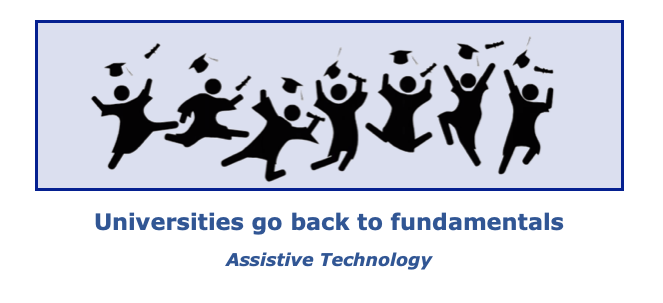
Disability Services such as Inclusive Education Coordinators, Assistive Technology Specialists and Assessors continue to recommend an array of old and new assistive tools and software.
Their aim is to equip neurodivergent students with the correct assistive tools to allow them to fully engage in class, whilst at university.
The array of options available is vast but for neurodivergent students, those with dyslexia, dyspraxia, ADHD, ASD, Tourettes, amongst others, many universities are going back to fundamentals.
Having watched a demonstration of KAZ Type’s neurodiverse typing software, which teaches typing skills whilst addressing visual disturbances, many sites, such as University College Dublin have implemented the program for the start of the new academic year. They believe that the fundamental skill of touch typing offers neurodivergent students a new and powerful medium for learning and communicating and has multiple benefits that help address many challenges:
Visual Disturbances
KAZ’s unique preference screen offers students a selection of preferences to choose from (specialised filters, fonts, font size and font colour). Once chosen, student’s preferences are ‘saved’ and applied throughout the course – tailor making it for optimum visibility comfort.
Cognitive Limitations
The program’s multi-sensory ‘accelerated learning’ teaching method, enables students to learn using more than one sense (sight, sound and touch). With this method, information is more likely to be remembered and retained. Students can hone in on their most comfortable and preferred style of learning (visual, auditory or tactile pathways). In this way learning becomes more natural, making learning easier and in turn faster – ‘accelerated learning’.
Difficulties with spelling
KAZ’s accelerated learning teaching method incorporates ‘muscle memory’. With repetition of typing only ‘real words’, spelling and vocabulary are engrained to memory. Spellings become a series of finger movements and patterns on a keyboard, dramatically reducing the likelihood of transposing and misspelling words. The program helps train students to recognise words by sight, saving the decoding process that often causes trouble when reading.
Poor and messy handwriting - (this can lead to embarrassment, frustration and anxiety).
Teaching typing skills eliminates the need for neat handwriting, as touch typing automatises the translation of thoughts and ideas into written language. Additionally, errors can be easily edited without messy crossings out, resulting in neat and presentable work – automatically boosting confidence and self-esteem.
Slow work rate - (due to poor penmanship).
Quick and accurate typing can reduce the amount of time spent on a piece of work, and often increases the amount of work produced.
Additionally, when used in exams, if students can type efficiently and subconsciously, their ‘conscious’ minds can concentrate on the question at hand, planning, creative writing, proof reading but most importantly, type quickly enough to finish their paper.
Poor Working Memory
The KAZ course is presented in a structured and light hearted manner and has been designed NOT to overload the working memory. The program is broken down into short modules in order to hold focus and concentration and allows the student to work at their own pace. Additionally, they are allowed to return to previous modules at any time should they wish to refresh. Working at a computer allows students to work in a non-linear fashion, where they can process their thoughts first and structure them later.
Social interaction - (this can lead to anxiety and depression).
Teaching typing skills enables students to communicate without the need for social interaction – reassured by the fact that computers do not have faces or emotions.
Difficulties with verbal / non- verbal communication - (sometimes due to apraxia – a motor skills difficulty, affecting the ability to plan and coordinate the muscles of the mouth, throat and face.
Teaching typing skills offers students an alternate form of communication.
Involuntary tics - (related to the hands, fingers, wrists, arms, neck, head and eyes).
Cramping in hands, poor coordination, fine and gross motor skills and physical dexterity - (this can make writing tiresome and even painful).
Teaching typing skills can help reduce physical pressure, cramp and pain in hands and wrists, as pressing keys on a keyboard can be much easier compared to gripping and manipulating a pen or pencil. It also eliminates the need for accurate letter formation and spacing words on a page. Additionally, with practise and repetition, typing can enhance / develop fine motor skills, hand-eye coordination and physical dexterity, in turn helping handwriting skills.
Frustration - (Abled autistic student’s minds work faster than their hands can write – this again can cause frustration with inadequacy).
Teaching efficient typing skills enables students to type at speed, allowing them to keep up with their thinking.
Universities are also keen for students to progress onto KAZ’s City & Guild’s Edition. This edition includes a multiple choice paper and typing test, recording speed and accuracy. On successful completion, all candidates receive a digital badge and certificate to showcase on their social media profiles, CVs and job applications.
Copyright KAZ Type Limited 2025. KAZ is a registered trade mark of KAZ Type Limited.
Developed by : STERNIC Pvt. Ltd.